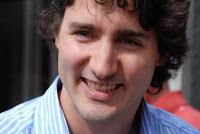Liberal MPs delight party faithful, woo ethnic vote with attack on Conservative policy
Ujjal Dosanjh and Justin Trudeau visited Vancouver Quadra to push Liberal party immigration policy.
by Darren Fleet, Vancouver Observer
In Liberal MP Joyce Murray’s packed Vancouver–Quadra riding office, supporters stood shoulder to shoulder to hear Liberal MP’s Justin Trudeau and Ujjal Dosanjh criticize an array of Conservative citizenship policies Wednesday.
Click here to read original article in the Vancouver Observer
As the author of another proposed “Lost Canadians” amendment, Vancouver–South MP Ujjal Dosanjh, took a moment to talk to The Vancouver Observer.
“I had a private members bill that the government wanted to adapt but obviously that didn’t complete this issue,” Dosanjh said of Bill C-467, stalled by the election call.
“When we get back into parliament we are going to have to re-consider that, and I may reintroduce my private members bill perhaps in an expanded capacity to deal with the issues that weren’t taken into account,” he said.
Dosanjh’s 2010 proposal was an attempt to amend a specific clause of 2009’s “Lost Canadian” legislation, Bill C-37. While Bill C-37 created a path to citizenship for potentially hundreds of thousands of Canadians stripped of their Canadian nationality because of prejudice and outdated citizenship regulations, it didn’t extend citizenship to all Lost Canadian claimants, nor did it close the door for future Lost Canadian cases. No sooner than Bill C-37 ascended the first of a new generation of stateless Canadian’s was born – including Rachel Chandler, the daughter of two Canadians who were also born abroad.
As the law reads today, if a Canadian has a child overseas, that child is Canadian, but the children of that offspring wouldn’t be Canadian if they too were born overseas. Bill C-467, had it gone through, would have dealt specifically with these second generation, born-abroad Canadians.
Dosanjh argued that Conservative Citizenship and Immigration Minister Jason Kenney is aware of other shortcomings of Bill C-37, but that the continued complexities surrounding the Lost Canadian issue, specifically the need to curtail an endless ability to pass on citizenship, made changing the law difficult. He also noted that while Conservatives are willing to engage the issue, they’re not holding their arms too widely open.
“Mr. Kenney is not open to dealing with all the Lost Canadians. He was open to dealing with the narrow scope of my bill, but I hope he is more open to the issues,” Dosanjh said.
Jason Kenney declined to comment to The Vancouver Observer.
Micheal Vonn, policy director of The BC Civil Liberties Association, expressed shock at some of the more infamous Lost Canadian cases, specifically the woes of children of Canadian soldiers born overseas, like Jackie Scott, who are still without Canadian citizenship.
“It defies common sense that the children of World War II veterans should be subjected to years of administrative wrangling based on the marital status of their parents. The basic presumption should be that people should have timely recognition of their Canadian citizenship if blatantly discriminatory laws prevented them from acquiring citizenship from their parents,” she said.
Scott, 65, migrated to Canada as a child with her Canadian soldier father and British mother, only to be told upon applying for a passport in 2005 that she was not Canadian. Scott was born out of wedlock during the Second World War. According to current citizenship law that applies to people born before 1947, her nationality is that of her British mother, not her Canadian father. Had her parents been married at the time of her birth, she would be Canadian.
Scott has been denied recognition of citizenship twice and has two more application in the system.
“The government must move quickly and decisively to provide the 'Lost Canadians' with their citizenship," said Vonn.
"This is a matter of vital importance. The denial of citizenship status, where it unfairly makes a person stateless, is a breach of international human rights law.”
Click here to read original article in the Vancouver Observer
skip to main |
skip to sidebar

Translate
Search This Blog
SITEMAP
Home
Contact Don Chapman
Contact Don Chapman
Readers Digest December 2011
Voice America: David Gibbons "In Discussion"
Vancouver Observer Award Winning Series
CBC News In Depth Feature
Who are the Lost Canadians
Lost Canadian Timeline
12 Ways to Lose Your Citizenship
In the News
YouTube Videos
What Is Bill C-37?
How Can You Help?
The Curious Case of Jack Babcock
Voice America: David Gibbons "In Discussion"
Vancouver Observer Award Winning Series
CBC News In Depth Feature
Who are the Lost Canadians
Lost Canadian Timeline
12 Ways to Lose Your Citizenship
In the News
YouTube Videos
What Is Bill C-37?
How Can You Help?
The Curious Case of Jack Babcock
DON CHAPMAN

- Lost Canadian
- Gibsons, British Columbia, Canada
- I am Don Chapman, the leader of the Lost Canadians. I was born in Vancouver, British Columbia and when I was six years old I lost my citizenship. I've been fighting for it ever since.


